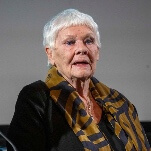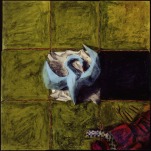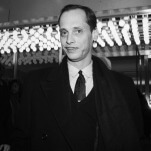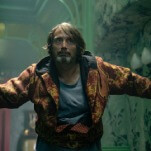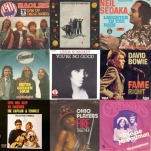La La Land debuts tonight on Showtime at 11 p.m. EST.
Is there an endless number of British and Australian actors who want to come to our shores and create shows where they play three different characters at once? Naturally, there's Da Ali G Show, Sacha Baron Cohen's brilliantly subversive look at Americans' desire to avoid confrontation, and just a couple of seasons ago, there was Chris Lilley's Summer Heights High, one of those great, fun shows that basically no one watched, where Lilley played three different characters at the eponymous institution. Now, we have Marc Wootten's La La Land, where the actor plays three different people trying to navigate the treacherous waters of Los Angeles and show business. Unfortunately, the show falls prey to the fact that Wootten has basically nothing to say about show business beyond "People in Hollywood are fatuous and stupid!" which is something that every other show business satire (and there are too many of them) is already saying.
The best thing about Ali G – the closest ancestor to this show – was the way that Cohen was both truly fearless and had something to say about the U.S. He was great at exposing the convoluted hypocrisies of the nation, and even if everything he did had the slight feeling of being a little too staged, the comic points he made through his three main characters – Borat, Ali G. and Bruno – were so incisive that the very concepts of some of his sketches could make you laugh before he even started improvising. The same goes for Lilley, who was working within a more scripted environment but definitely had something to say about both education and the way the school system is usually portrayed on TV.
Now, Wootten's three characters – boorish actor Gary, daffy psychic Shirley (a man) and oblivious documentarian Brendan – all have moments when they draw laughs. But La La Land is let down in the end by not having any point-of-view on its characters or the people they interview. Gary, Shirley and Brendan are all just stupid, without any real redeeming value as ways to plumb the depths of Los Angeles-based idiocy. Even an ill-advised shift into political commentary in the series' fourth episode, when Brendan follows around a Minuteman who wants to crack down hard on illegal immigration and close down the borders, doesn't have a specific point of view on Minutemen. You always knew what Cohen thought, exactly, of his targets. Wootten, by contrast, makes Brendan the butt of the joke in the Minuteman segment, and the whole thing misses any cutting satire.
There's slightly more potential there with Gary, a guy who comes to Hollywood convinced he's the next big thing and everyone else just needs to catch up. Sure, that's a stereotypical portrayal of a fledgling actor, but the best thing about the Gary segments is the fact that the character has to traverse the seamy underbelly of starting out in Hollywood. He ends up in contact with all kinds of faded stars who have conflicting advice for him, producers who seem more criminal than legitimate and low-rent professionals who try to offer him the services he needs to break through. Gary's needlessly confrontational persona also helps drive every scene he's in, giving these scenes the conflict they need to drive the story forward or provide any humor that the show comes up with.
Now, I've only seen four episodes of the show, so it's possible that it develops a more original point-of-view and a spine at some point in its run, but based on those four episodes, I think it's more likely that the show is just going to run the same types of jokes into the ground. Wootten's characters don't really have an arc to them beyond having the same arc over and over again. Gary walks into a situation and acts like a guy who should be given all of the best Hollywood has to offer. Shirley is dumb and way too enamored of talents he obviously doesn't have. Brendan's documentary ideal is far too scripted. There's an attempt to give all of the characters backstories that will give them more material to play (Gary totes around the remains of his dead mother; Brendan has a failed marriage back home and a son he's trying to bring to Los Angeles), but those attempts often just feel like ways to pad out what's basically a sketch show crossed with Candid Camera.
All good "gotcha!" shows have to blend the inherent cringiness of the material – we know that the actor is putting one over on the people involved in the gag, so our sympathies may drift to the people who aren't in the know if the material isn't played just right – with such original comic material that we don't mind normal people being made the butts of jokes. Again, this is a skill that Cohen has most of the time that Wootten just doesn't. To compensate for that, he's found people who are extra oblivious at just how far out of the mainstream they've fallen, like an old-time Hollywood actress who offers to take Gary under her wing and instead mostly just issues random observations that don't seem very funny in what they either have or don't have to say. Wootten relies too heavily on his characters being so stupid that they prompt more stupidity around him, and this proves hit and miss.
But, that said, there are moments in these episodes that are genuinely laugh out loud funny. There's a lengthy exchange Brendan has with another documentarian where he seems to be musing about making a film where he'll actually kill some mountain climbers on camera to increase drama, and watching the other guy squirm and then eventually agree that that would make a pretty good film is fascinating and funny to watch. Similarly, when Shirley sets up a psychic phone line, and some of his employees confront him about the fact that the psychic alarm clocks they're pitching to people are obviously not real, Wootten finally gets a chance to show off his skill at playing obliviously dumb people.
And that's probably what does La La Land in in the end. Wootten's fascination, obviously, is with the way that stupid people tend to flock together, the way that a city like Los Angeles can act as a beacon for people who are obviously deluded about their own talents. The problem is that by creating three very stupid characters and also trying to fill the show with idiotic real people, Wootten has created a series that has way too many scenes that act as death spirals of stupidity, sending everything racing for the bottom. The best moments of the series are when someone smarter than one of the characters tries to get through to them, and Wootten is free to play his characters' delusions to the hilt. Sadly, there are far too few moments like that overall.
Stray observations:
- It's also worth pointing out that the entire series is narrated by one of the most obtrusive voice-over guys I've heard in something like this. The whole device feels like a network note gone horribly, horribly wrong, and the series might have been better off giving Wootten talking head segments or just attempting to establish what's going on through context.


